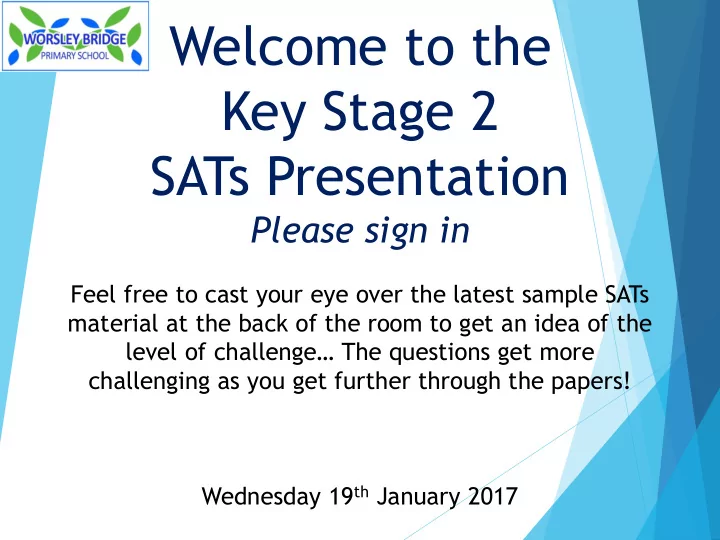

Welcome to the Key Stage 2 SATs Presentation Please sign in Feel free to cast your eye over the latest sample SATs material at the back of the room to get an idea of the level of challenge… The questions get more challenging as you get further through the papers! Wednesday 19 th January 2017
The Big Picture Children are formally assessed against national expectations at the end of each key stage. - End of KS1 – Year 2 - End of KS2 – Year 6 This is the second year that children will be assessed against the new national curriculum. The expectations have been raised. Children are continuously assessed by their teacher, in order to plan effectively for the next steps in their learning Children have to achieve the expected standard in Reading, Writing and Maths combined.
Scaled Scores The children’s scores will no longer equate to a level Every pupil will receive: a raw score for each test, a scaled score: 100 = national expectation and… confirmation of whether or not they attained the national standard. Last year children had to achieve Subject Raw Score Scaled Score Reading 22 + out of 50 100 GPaS 43 + out of 70 100 Maths 60 + out of 110 100
Timetable for SATs 8 th – 11 th May 2017 Mon 8 th Tues 9 th Wed 10 th Thurs 11 th Fri 13 th Reading Test GPaS Tests Maths Paper Maths Paper 1 – 3 - Arithmetic Reasoning Maths Paper 2 - Reasoning
The Reading Test Pupils are allowed 1 hour for the reading test. The test will include 3 or 4 different texts – past examples include stories, poems, explanations, classic texts, interviews and accounts. The questions will range from simple retrieval to more advanced inference and deduction.
The GPaS Test Spelling, punctuation and grammar Spelling Test – 20 words Written paper – 45 minutes
While he stood in a muddy field, the spotty cow mooed loudly. verb subordinate clause
Writing There is no writing test. Children will be given a writing level based on continuous teacher assessment throughout the year. Increased focus on spelling and handwriting
The Maths Tests There are 3 maths tests: - Paper 1 – Arithmetic: 30 minutes - Paper 2 – Reasoning: 40 minutes - Paper 3 – Reasoning: 40 minutes
Examples from last year’s papers
How are we supporting your children? Arithmetic Mental Maths Small group teaching in reading, writing, maths and GPaS Daily grammar sessions Daily guided reading sessions Daily reading comprehension Regular opportunities to write across a range of genres Opportunities to work through past SATs papers to familiarise children with the format of the paper and help them interpret questions. Trying our very best to not put the children under any unnecessary pressure; all we want them to do is try their best.
How can you support your child? Continue to support with homework, including reading, spelling and mental maths. Try your very best to not put the children under any unnecessary pressure; all we want them to do is try their best. Maintain normal routines at home Bedtime slightly earlier than normal during test week Encourage your child to eat healthily, especially breakfast
Studying and Revision Encourage your children to make links between their revision and what they have learnt in class Come and talk to us if you or your child have any subject specific questions when revising Homework
Life after the Tests Results will be sent back to school towards the beginning of July. The test results and a teacher assessment is reported to the Secondary School and to parents. Tests indicate what a child can do on ONE day, the teacher assessment gives a picture of a child’s ability over time.
What information will you receive from Worsley Bridge? Your child’s teacher will consider your child’s KS2 test results, their teacher assessment judgements and their own experience of the progress your child has made. They will use these to create a report by the end of the summer term, which explains how your child has done in maths, reading, writing, science and grammar, punctuation and spelling.
Should I be worried if my child isn’t at the expected standard? There is no reason to worry. The government wants to make sure every child has mastered the basics, so they can do well in life. It is important to understand how well your child is doing in these basic skills as early as possible. The results of the tests and teacher assessments help teachers identify where children might need extra help so they can work with secondary schools to put extra support in place. If you have any questions about how your child has done and what support they might need to do well in secondary school, you should speak to their teacher.
Thank you for supporting your child by attending tonight Any questions?
Recommend
More recommend